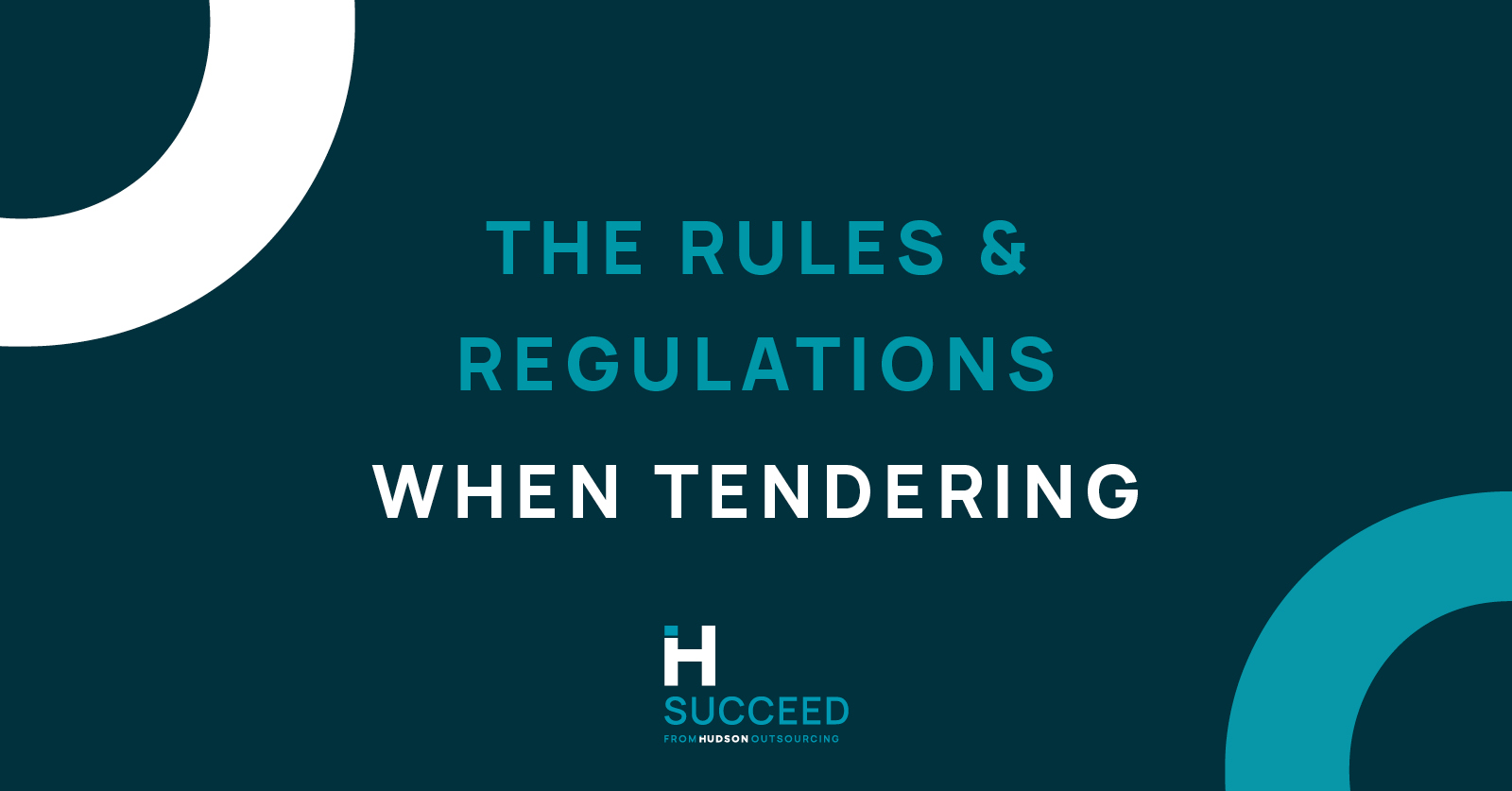What are the rules and regulations when tendering?
Last updated: Feb 8, 2022 @ 5:13 pm
Procurement: The aspect of a business that many organisations wish was easier
Buyers in the public sector, such as housing associations, councils, and other relevant government departments are dealing with public money. Our taxes! So, therefore, all that is procured must be done so in the fairest and most transparent ways possible. If any conflicts of interest and/or other bias proceedings occur when tendering, there can be serious consequences to this, with buyers paying massive fines and/or representatives facing prison time. The way in which procurement departments procure all works in the fairest way possible is called ‘sourcing the most economically advantageous tender’ (MEAT), which is usually established via an open process:
| Open Process |
Open to all organisations to submit a tender. On large projects, this may involve a pre-qualification process (PQQ) that results in a list of suitable suppliers who will be invited to tender (ITT). This open approach usually results in a large number of responses of varying suitability (i.e. both large companies AND SMEs). |
It has been noted that more needs to be done to ensure ALL organisations are familiar with the ‘open process’ of tendering and the rules and regulations behind it. Hudson Procurement Group are here to do just that! Our aim is to improve the nation’s understanding of the broad term that is procurement. We eliminate the worries and qualms of managing tender processes by providing lucrative guidance and advice to ALL.
Our focus here is purely based on how the rules of public sector tendering via an open process can affect you and what can be done to ensure you’re at the top of your game:
Each UK public sector buyer is obliged by EU law to:
· Publish the contract opportunity in the public domain – our industry-specific portals (incl. Creative Tenders, Finance Tenders and Technology Tenders to name a few) are the first of its kind to have manual daily bulletins processed/disseminated by an efficient team of people, rather than [mostly] flawed algorithms via automated systems used by ALL our competitors
· Inform all suppliers of how tenders are to be evaluated – 95% of the time this is split between a quality and a commercial ratio (sometimes including a presentation stage too). Outline your bid management strategy/focuses here. Is 80% of the mark purely based on cost? Are your rates competitive?
· Ask for whatever they feel is relevant to the opportunity – this could be method statements, evidence of past work, policies and written procedures. Are you up to date with all background content? You don’t want to spend another 2 whole days creating a new policy from scratch. This minimises time from your actual tender response
· Not discriminate against businesses registered in another EU country – so currently you may be up against your French competitors or other EU companies that are trying to make their mark in the UK. Know your market – how do you stand out?
· Clearly, state all deadlines – this includes deadline to ask clarification questions & deadline for submission etc. Organise your time wisely based on this!
· Provide at least a 10-day standstill period – this is the period between contract award notification and actual contract award, allowing other suppliers the opportunity to contest/dispute the decision[s] made.
As we all know, some sort of changes may likely occur over time due to the whole Brexit saga and we will be the first to update you on how this affects you. For now, there has been no immediate impact on the legislative position in the UK and all the provisions listed above continue to apply.
TUPE – what is it and how does it affect you?
I know what some of you are thinking – what on earth is TUPE?
One thing we are not here to do, is provide you a whole lot of legal jargon surrounding compliance and adherence to specific laws. This blog focuses on the basics of TUPE and how this applies to suppliers who are tendering for contracts!
TUPE is an abbreviation of Transfer of Undertakings Protection of Employment
This is commonly used in a range of industries and rarely used in others, however, we still think this is useful to comprehend, as this is widely considered across many UK tenders.
Let’s give you an example:
So, Bill, Bob and Ben are all IT Technicians for a local council on behalf of Company X.
Company Y has just won the tender to provide the IT Technical Solutions Contract over a 5-year period for this local council, meaning Company X will no longer provide the services.
To ensure Bill, Bob and Ben are not made redundant or out of work due to supplier changeover, the local council has stipulated that TUPE will apply as part of Company Y’s contract win.
Company Y must then liaise with Bill, Bob and Ben and ensure their transfer from Company X over to Company Y goes without a hitch. They undergo company consultations and inductions and ensure a fair and transparent tendering process is followed, which complies with regulations.
Make sense? – it’s basically a procedure, governed by law, to move employees and any liabilities associated with them from an old employer to a new employer, and when it comes to procurement and supplier changeover, TUPE can be rife!
How does it affect you?
Again, this is used dominantly in some sectors, whilst rarely used in others. You may find you may never have to deal with TUPE. But it’s always good to be aware of what to expect.
The likes of Engineering, Technology, Construction, Utilities, Manufacturing and Logistics, where continuous delivery/support is required with certain buyers from grass-root operatives, means TUPE majorly applies to ensure employees of Company A can continue to work on contracts when Company B takes over.
If TUPE does apply and you have to inherit one or more employees as part of the contract win, you’ll have to consider multiple things regarding the management of TUPE as per your tender response.
Things to consider:
- Assess the TUPE database! – this may be on a spreadsheet or a similar information sheet – make sure full assessment is made on this. This should detail employee liabilities, such as sick pay, holiday pay, etc. This is where the most basic details of the employee come to light, so you can ensure you can afford the staff you may potentially inherit.
- Price Correctly! – use the details of all TUPE staff (acquired from the database/information sheet) to ensure you are taking into account clear variances in your pricing model. You, as Company 2 may pay your staff a specific amount, but Company 1 may pay them a lot differently. Take this into consideration.
- Understand your responsibilities! – do you need to contact the new employees directly or will the buyer bridge this relationship initially? – Understand what you need to do when it comes to managing TUPE staff.
- Get Help! – in your tender response, if there are any questions on TUPE management, state how you’ll use a reputable and fully qualified legal service for support, advice and guidance to ensure full complicity against the regulations.
How about discovering those all-important opportunities where TUPE may or may not apply? Our Discover service, offers 11-industry-specific platforms providing you will both public and private opportunities across your sector.
Exclusion Grounds: Self-Cleaning
An explanation
Exclusion grounds when tendering is where you’ll see the ‘Self-cleaning’ option. Quite simply – Self-cleaning allows suppliers to pass the initial stages of a tender or a pre-qualification questionnaire (PQQ), even if they have demonstrated ‘foul’ play in the past.
When we say ‘foul’ play, what we mean is – any criminal activity that has been affiliated with the supplier’s organisation. This can include being guilty of tax evasion, corruption, fraud, money laundering, as well as being in breach of social and environmental obligations, to name a few.
This is a crucial part of the tendering process, as there are many pass/fail questions throughout a tender. Historically if you had been found guilty of any of these exclusion grounds, you would fail the first round of tendering. This way, suppliers would find it difficult to go for both public and large-scale private opportunities. Especially from up to three years from the date of the conviction.
What to expect
Now, as per the Public Contract Regulations 2015, if a potential supplier (or any organisation they rely on to meet the selection criteria) has breached any of the exclusion grounds, they have the opportunity to explain how and what action they have taken to rectify the situation.
They basically, get to ‘clean up their act’ by providing a separate document (appendix), describing what measures have been taken, to make sure that any wrongful and/or criminal activities will NEVER occur again (see extract below).
You’ll find this probably won’t apply to you and we have only worked with a handful of clients, where we have had to support the development of a ‘Self-Cleaning’ appendix.
If this does apply to you and you have ticked YES on one of the exclusion grounds as part of the PQQ, you must then demonstrate your mitigation approaches, which can include:
- Evidence of proactive collaboration with remedial and investigatory agencies (such as the police, Health and Safety Executive or the Environment Agency), which details the whole issue/activity that has been identified and mitigated
- and evidence of the stringent measures/steps you have taken to prevent any reoccurrence.
If you can provide this effectively – then you shouldn’t be excluded. It is, however, completely at the buyer’s discretion to whether or not they continue with the initial evaluation. If not, they must provide you with a detailed explanation of why your ‘self-cleaning’ is deemed inefficient.
These are just a few regulations in a very large pond filled with procurement jargon you’ll come across when tendering for contracts. Our Tender VLE service ensures this jargon is broken down and shared via understanding methods and practice.
The days of wishing the tendering process were easier are now over! Speak to one of our Bid Writers about how they can help you understand the rules and regulations when tendering and write a winning bid today.
Find more helpful tips and advice in our blogs. We cover topics including:
Our services
Tender Writing
Once you’ve found the perfect bid for your business, send it our way. Our Bid Writers can take care of the whole thing for you they’ll even submit it on your behalf. They’ll let you know what they need from you, providing you with a full Tender Writing breakdown.
Tender Ready
Our Tender Ready 4-week programme is perfect for businesses that have never tendered before. A Bid Writer will work with you to ensure you have everything in place to tender successfully. They can also help you better understand the tendering process. Tender Ready offers your business:
- A 12-month subscription to one Hudson Discover.
- Access to Global Bid Directors and Senior Bidding Professionals.
- An Organisation-wide Bid library, including 3 case studies, 5 CVs and policies.
- Additional flexible benefits.
Tender Improvement
If you’ve been tendering but aren’t seeing success from your current efforts, our Tender Improvement package can help. Our Bid Team will assess your previous responses and tender documents. They will work with you to improve for future submissions. This package includes a 12-month subscription to a Hudson Discover portal and additional tendering development services.
Tender Mentor
If you’ve written your own tender response and need it double-checked for errors, Tender Mentor can help. A Bid Writer will proofread your work for any inconsistencies, grammar or spelling mistakes. They will also ensure it’s in line with the specification before you submit. This can help you formulate a winning submission.
Additional support
If you only need assistance with PQQs or SQs we can help. Send the information over to us and we can provide you with a quote for the work involved.
Discover Elite
Upgrading to Discover Elite can help optimise your tendering efforts – even when you’re busy. Our two new time-saving tools can improve your competitor awareness and success rate when bidding for a contract.
The Ultimate Time Saver package offers your business:
- A maximum of five tender breakdowns per month.
- An annual subscription to a maximum of two Hudson Discover sector-specific portals. This option can help businesses that overlap two industries such as Healthcare and Technology, for example.
- Pre-market and award engagement notices monitored on your behalf.
- Buyer portal management, including registration, password management, downloading documents and assessing viability based on your bid or no-bid strategy.
- Weekly phone calls with your dedicated Account Manager to discuss viable tendering opportunities.
The Become a Pre-Bid Master package also includes:
- All of the above.
- Up to seven tender breakdowns per month.
- A Bid Strategy delivered by a Senior Bid Manager with a minimum of 5 years of experience. It will also be managed by our Global Bid Director.
Contact us to find out how we can help your business grow.







